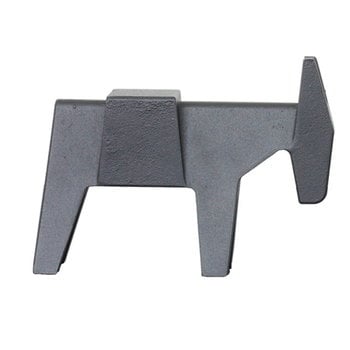Designed by Konstantin Grcic, Ettore mule was launched to celebrate the 40th anniversary of Magis. Strong-willed, tireless and continuously exploring new paths, the mule has been the symbol of Magis for years. Ettore mule is made of heavyweight, rugged cast iron and it can be used as a door-stop or decorative statue.
Ettore door-stop
Magis
Description
Designed by Konstantin Grcic, Ettore mule was launched to celebrate the 40th anniversary of Magis. Strong-willed, tireless and continuously exploring new paths, the mule has been the symbol of Magis for years. Ettore mule is made of heavyweight, rugged cast iron and it can be used as a door-stop or decorative statue.
Product details (3)
- Size
- Length 25 cm, width 6.5 cm, height 18 cm
- Material
- Cast-iron painted in polyester powder
- Colour
- Grey
- Product ID
Designer
The German designer Konstantin Grcic (b. 1965) studied in Royal College of Art in London. In 1991 he founded his own company, KGID. Over the years, Grcic has had many well-known clients such as Magis, Vitra and Iittala. The cooperation with Magis lead to one of the most interesting and inventive chairs of our time, the Chair One. Chair One became a design icon and a part of the permanent collections in MoMA in New York and Centre Georges Pompidou in Paris.
View all productsReviews (2)
5
Based on 2 reviews
-
T
Terence M
New Zealand
Excellent service - just love how quickly they ship. Great design as well!!!
43 days ago
-
B
Bryan J
Portland, United States
It is a remarkable work of art, although I would never use it as a door-stop. The design is simple and elegant. Take care not to drop this piece; it will likely break your toe or put a hole in your floor. Outstanding work of functional art.
36 days ago
Sustainability
The Product Sustainability Framework, our criteria of sustainable design, helps you find the most sustainable products in our selection. Read below which sustainability criteria this product has met.
Working conditions & labour 9/9
-
Equal opportunities for all employees
-
Commitment to UN Global Compact, fair compensation for all employees
-
Corporate responsibility requirements defined and communicated for suppliers
-
Systematic work for improved inclusion and well-being in the workplace
-
Transparent supply chain
-
Suppliers' compliance to a code of conduct ensured
-
Direct suppliers audited and certified
-
Compliance to the UN Guiding Principles on Business and Human Rights ensured in the supply chain
-
Support for community involvement in the supply chain
Eco-friendly production 7/9
-
Fair and resource-wise water-use in production
-
No incineration or landfilling of returned items
-
No use of endangered species as materials
-
No direct environmental emissions or waste (excl. GHGs) from production
-
Material-efficient and ecological packaging
-
Positive impact on nature’s well-being through operations that regenerate natural ecosystems
-
No potentially harmful chemicals used in own production
-
The sustainability of direct suppliers' production is addressed and monitored
-
Production and material sourcing that respect biodiversity, animal rights, and natural ecosystems
Climate impact 5/8
-
Company's direct greenhouse gas emissions identified and commitment to reduction
-
Product's carbon impact identified and commitment to reduction
-
Guidance on energy- and eco-efficient use of the product
-
Contribution to climate initiatives beyond the brand’s direct operations
-
100 % renewable energy in own production and operations
-
Low-carbon or compensated transportation
-
Carbon footprint of the product calculated and goals set to reduce it
-
Carbon neutral or carbon negative product
Sustainable materials 6/6
-
Sustainable and long-lasting material choices
-
No harmful or hazardous substances
-
Responsible raw material sourcing and production
-
Materials suited for circularity: monomaterials, recyclable finishings, renewable or recycled contents etc.
-
Ecological materials: natural, biodegradable, recyclable or recycled contents
-
Outstanding materials in terms of innovativeness, responsibility, sustainability and circularity: local production or sourcing, 100 % recycled content, C2C-certification etc.
Circular design 4/5
-
High aesthetic quality promoting long-term use of the product
-
Technically durable product design and material choices
-
Design for enduring life-long quality
-
Design and support for product maintenance, repair and upgradability
-
Innovative circular design solutions: circular service system, resale platform, remanufacturing, collection of used products, etc.





